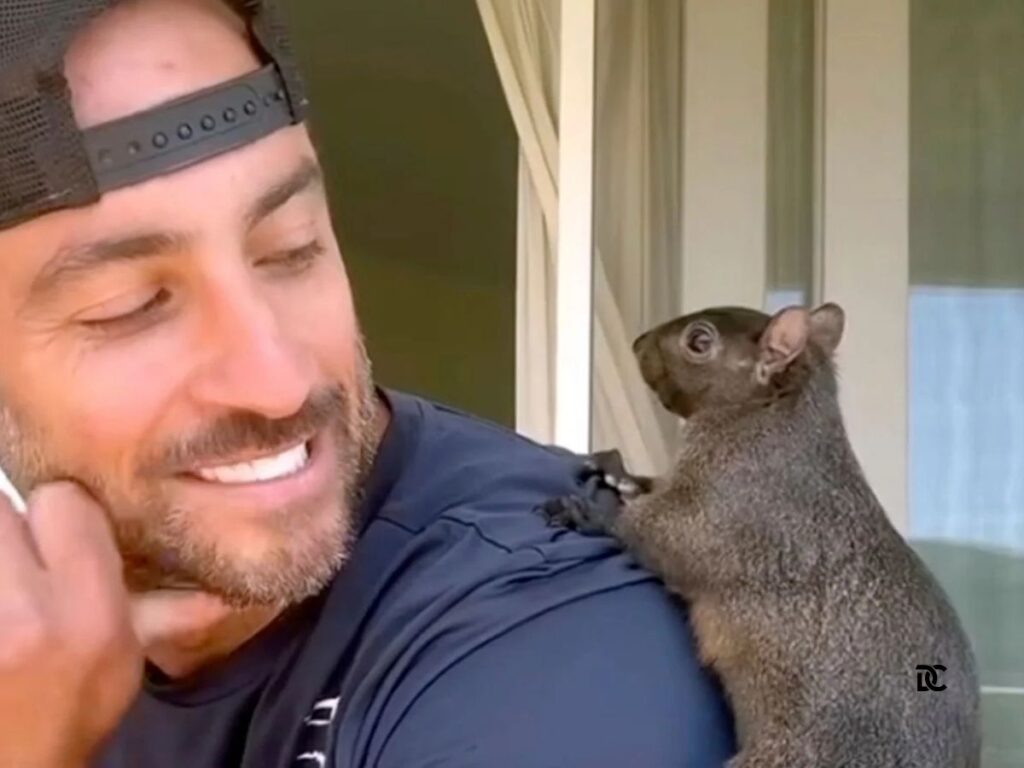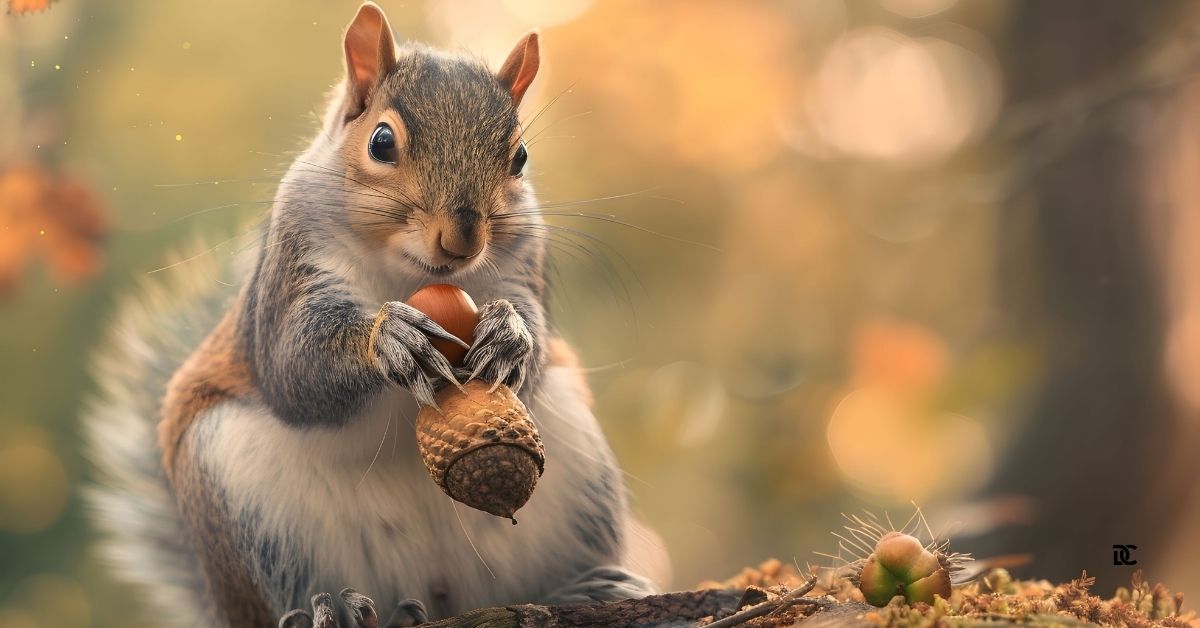Peanut the Squirrel has been euthanized just two days after being seized from his New York home. The beloved pet, known for his vibrant social media presence, met his untimely end following precautionary measures by authorities. This incident has left fans and followers devastated, raising questions about wildlife ownership and safety regulations.
On Wednesday morning, New York State Department of Environmental Conservation (DEC) officials, alongside the Chemung County Department of Health, entered the residence in Pine City, New York. Their mission: to confiscate Peanut the Squirrel and a raccoon from the household. The decision to seize these animals came after a reported bite incident involving the squirrel.
Peanut, also known as PNUT, was the cherished pet of Mark Longo, a content creator with a substantial online following. With over 534,000 Instagram followers, Peanut was a social media star, featured in more than 1,400 posts. Fans adored seeing Peanut engage in playful activities, from munching on waffles to jumping through hula hoops and greeting Longo home each day.
The authorities acted swiftly following the bite incident. Both Peanut and the raccoon were euthanized to undergo testing for rabies, a serious and often fatal disease. The DEC and Health Department released a statement confirming that rabies has been present in raccoons within New York’s Southern Tier, including Pine City, for over three decades.
Also Read
Rabies poses significant health risks to both humans and animals, justifying the strict measures taken by authorities. The bite incident involving Peanut necessitated immediate action to prevent any potential spread of the disease.
Mark Longo was devastated by the news of Peanut’s euthanization. Known for his deep bond with his pets, Longo shared his sorrow through various statements on Peanut’s Instagram account. He kept fans updated, expressing hope that Peanut might return home safely. However, as of the latest updates, Longo has not made a public statement regarding the recent developments.
Longo’s grief has resonated deeply with Peanut’s followers. A Change.org petition was launched, garnering over 28,000 signatures, urging authorities to reconsider the decision and return Peanut to his family. Additionally, a GoFundMe campaign raised $7,875, aiming to support Longo and potentially facilitate Peanut’s return if possible.
Who is Peanut the Squirrel?
Peanut’s journey began under tragic circumstances. Longo first encountered Peanut after witnessing the squirrel’s mother struck by a car. The mother did not survive, leaving Peanut orphaned. Unable to find a suitable shelter, Longo took it upon himself to care for the young squirrel.

For approximately eight months, Longo fed and nurtured Peanut, forming a strong bond. His efforts to release Peanut back into the wild were met with challenges. After releasing Peanut in his backyard, Longo discovered the squirrel injured, missing half his tail. This incident solidified their bond, and Peanut remained a cherished companion.
Peanut lived harmoniously with Longo and Longo’s cat, Chloe, for five years. Their home was a sanctuary where humans and animals coexisted peacefully, showcasing the possibility of interspecies friendship and care.
In response to the challenges of caring for stray and injured animals, Longo established P’Nuts Freedom Farm Animal Sanctuary in Pine City last year. The nonprofit organization aims to provide a safe haven for neglected and homeless animals, offering them a second chance at life.
The sanctuary is home to a diverse group of animals, including 18 horses, one mini horse, four cows, three alpacas, one parrot, one pig, and two geese. P’Nuts Freedom Farm serves as a testament to Longo’s dedication to animal welfare, embodying his commitment to creating a compassionate environment for all creatures.
Peanut’s substantial Instagram following played a significant role in shaping public perception of the incident. As a social media star, Peanut’s daily adventures and interactions were shared widely, endearing him to thousands of followers. This online presence amplified the shock and sadness surrounding his euthanization, as fans felt a personal connection to the beloved squirrel.
The overwhelming public response, including the petition and fundraising efforts, highlights the influence of social media in mobilizing support and advocacy. Fans united in their desire to see Peanut returned to his family, demonstrating the deep emotional bonds formed through digital platforms.
The seizure and subsequent euthanization of Peanuts raise important legal and ethical questions about wildlife ownership and animal welfare. While Peanut was a beloved pet, squirrels are typically considered wild animals, subject to specific regulations and restrictions.
New York State has stringent laws governing the ownership of wildlife aimed at protecting both the animals and public health. These laws mandate the reporting and regulation of wild animal ownership to prevent the spread of diseases like rabies and ensure the animals’ well-being.
Ethically, the situation underscores the complexities of human-animal relationships, especially when dealing with wild or semi-wild creatures. Balancing compassion for individual animals with public safety and regulatory compliance presents a significant challenge for authorities and pet owners alike.
Why does Peanut the Squirrel have to be euthanized to test for rabies?
Rabies is a critical public health concern, particularly in regions where it has been prevalent for extended periods. The presence of rabies in raccoons within New York’s Southern Tier underscores the ongoing risks posed by wildlife.
Rabies prevention efforts focus on controlling the spread of the disease through vaccination programs, public education, and responsible animal management. Incidents like the one involving Peanut highlight the importance of these measures in safeguarding both human and animal populations.
Educating the public about rabies, its transmission, and prevention is essential in reducing the incidence of such cases. Responsible pet ownership, including adherence to wildlife regulations and prompt reporting of animal bites, plays a crucial role in these efforts.
Public Response and Support
Mark Longo’s public profile as a content creator has garnered him significant support during this difficult time. His followers have rallied around him, offering condolences and support through various platforms. The petitions and fundraising campaigns reflect a community united in their empathy and desire to help.
Longo’s dedication to animal welfare, exemplified by his establishment of P’Nuts Freedom Farm, has further endeared him to his supporters. His efforts to provide a sanctuary for neglected animals demonstrate his commitment to making a positive impact on animal lives, both in his personal sphere and the broader community.
What is P’Nuts Freedom Farm
Animal sanctuaries like P’Nuts Freedom Farm play a vital role in providing care and shelter for animals in need. These facilities offer a safe environment where animals can live out their lives free from neglect and abuse, receiving medical care and love.
Sanctuaries also serve as educational centers, raising awareness about animal welfare issues and promoting responsible pet ownership. By highlighting the stories of animals like Peanut, sanctuaries help foster a culture of compassion and empathy towards all living beings.
Operating an animal sanctuary involves numerous challenges, including funding, resource management, and regulatory compliance. Sanctuaries rely heavily on donations and community support to sustain their operations and provide for the animals in their care.
Ensuring compliance with state and federal regulations requires meticulous planning and adherence to standards designed to protect animal welfare. Balancing the needs of diverse species, each with unique care requirements, adds another layer of complexity to sanctuary operations.
What will happen to Peanut the Squirrel?
While Peanut’s story has come to a tragic end, it serves as a poignant reminder of the delicate balance between human compassion and wildlife management. The outpouring of support for Longo and Peanut underscores the deep connections formed between humans and animals, even in digital spaces.
Moving forward, Peanut the Squirrel will likely influence ongoing discussions about wildlife ownership and the responsibilities of pet owners. His story may inspire changes in policies or increased support for animal sanctuaries, fostering a more humane and informed approach to wildlife care.
Peanut’s case highlights several critical lessons for both individuals and authorities:
- Importance of Wildlife Regulations: Strict adherence to wildlife ownership laws is essential in preventing disease transmission and ensuring animal welfare. Clear guidelines help protect both animals and humans from potential risks.
- Role of Social Media in Advocacy: Social media platforms can amplify voices and mobilize support for causes, demonstrating the power of digital communities in effecting change and raising awareness.
- Need for Support Systems: Individuals caring for wild or semi-wild animals may require additional resources and support. Access to shelters and veterinary care can prevent situations where animals are left without proper care.
- Ethical Considerations in Animal Care: Balancing compassion for individual animals with broader public health concerns requires thoughtful and ethical decision-making by authorities and pet owners alike.
Peanut’s euthanization has had a significant impact on the local community in Pine City and beyond. Longo’s animal sanctuary, P’Nuts Freedom Farm, has become a focal point for discussions about animal welfare and responsible pet ownership.
Community members have expressed their support for Longo’s efforts, recognizing the sanctuary’s role in providing a safe haven for neglected animals. The incident has sparked conversations about how communities can better support animal welfare initiatives and ensure that pets receive the care and attention they need.
In response to incidents like Peanut’s, communities may seek to strengthen animal welfare initiatives. This could involve increased funding for sanctuaries, enhanced public education on responsible pet ownership, and stricter enforcement of wildlife regulations.
Collaborative efforts between government agencies, nonprofits, and local communities are essential in creating comprehensive strategies to address animal welfare challenges. By working together, these stakeholders can develop solutions that protect both animals and public health.
For pet owners like Mark Longo, the loss of a beloved animal companion can be devastating. The bond between humans and animals is profound, providing emotional support and companionship. Losing a pet, especially under such distressing circumstances, can have a lasting emotional impact.
Support systems, including counseling and community networks, can help pet owners navigate their grief and cope with the loss. Recognizing the emotional toll of such incidents is crucial in providing the necessary support to those affected.
Supporting Animal Welfare Through Legislation
Legislative measures can provide a framework for improving animal welfare standards and regulations. Strengthening laws related to wildlife ownership, vaccination requirements, and humane treatment can help prevent incidents like Peanut’s from occurring in the future.
Advocacy groups and community members can influence policy changes by voicing their concerns and supporting initiatives aimed at enhancing animal welfare. Effective legislation requires collaboration between lawmakers, animal welfare organizations, and the public to address the multifaceted nature of these issues.
Creating Safe Environments for Animals
Ensuring that animals live in safe and supportive environments is paramount. This involves providing access to veterinary care, secure habitats, and resources to meet their physical and emotional needs.
Animal sanctuaries, like P’Nuts Freedom Farm, play a vital role in creating such environments, offering a sanctuary where animals can thrive. Expanding the reach and capacity of these facilities can help accommodate more animals in need and reduce the strain on individual pet owners.
Educating the Public on Wildlife Care
Public education is essential in promoting responsible wildlife care and preventing the mistreatment of animals. Educational programs can inform individuals about the specific needs of different species, the importance of proper care, and the legal implications of wildlife ownership.
Schools, community centers, and online platforms can serve as venues for disseminating this information, reaching a broad audience, and fostering a more informed and compassionate society.
Building a Supportive Community for Animal Lovers
Creating a supportive community for animal lovers can provide a network of resources and assistance for those caring for animals. Community groups, online forums, and local organizations can offer guidance, share experiences, and provide emotional support to pet owners and sanctuary operators.
Fostering a sense of community helps ensure that individuals do not feel isolated in their efforts to care for animals, promoting a collective approach to animal welfare and protection.
The loss of Peanut the Squirrel is a sorrowful event that resonates deeply with his fans and the broader community. His story underscores the importance of balancing human-animal relationships with safety and regulatory measures, ensuring the well-being of both animals and humans alike.






